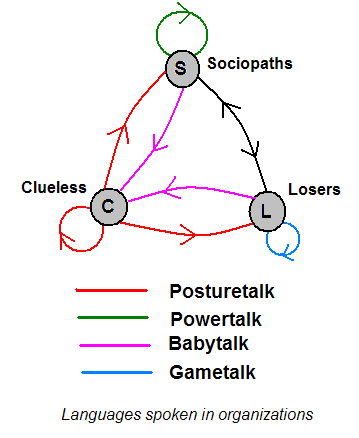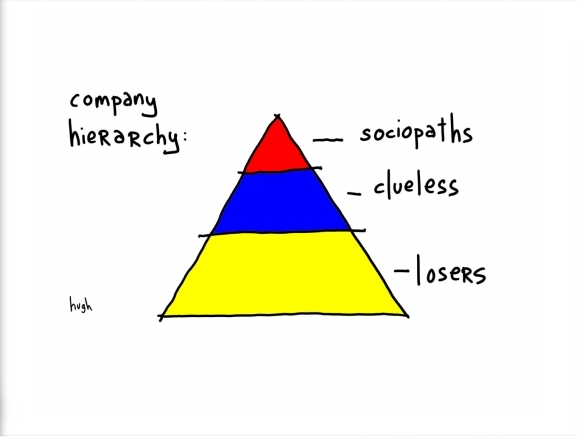In the Gervais Principle Ribbonfarm series, he spends several posts talking about how Sociopaths, Clueless, and Losers communicate among themselves and among each other and this is another aspect that I think is really valuable to apply to the dating world and gives great insight into why women are so much better at this than men.
Here’s the diagram:

The first thing to understand before we move on is to talk about what he calls “table stakes”. As I mentioned in the previous post on the Gervais Principle the difference between Sociopaths and Losers is that Losers care about emotional gains while Sociopaths care about “real” gains.
Table stakes are potential “real” gains for others. In the case where a Sociopath is interacting with a Clueless he an offer empty signifiers of success like a better title, or a trophy, while in dealing with a Loser he might offer praise. These are not “table stakes” because they are essentially cost free for the Sociopath.
However when a Sociopath is negotiating with another Sociopath, they both have to be very careful about how they present their table stakes. This is the world of boardroom confrontations and backroom haggling, where people are playing hardball—this is Powertalk.
Where you are trying to get the maximum while giving up the minimum.
Gametalk by comparison is the world of emotional payoffs. This is the world of letting everyone be a winner, and making sure that everyone feels good about themselves all the time.
If you’re not good with women then you’ve heard a constant stream of Gametalk, and probably participated in a fair bit of it too. Things like:
“Don’t worry, there’s someone out there that’s perfect for you.”
“I’m sure you’ll find a nice girl who will really appreciate you.”
“These girls aren’t good enough for you…you can do way better.”
“There’s someone for everyone.”
“She just too stupid to know how great you are.”
“Just be yourself and girls will like you.”
“She doesn’t deserve you.”
These kind of empty phrases that are designed to make you feel better about your lack of success without providing any real way for you to change your outcomes is what Gametalk is all about.
Cover up your failure with good feelings and slaps on the back—verbal handjobs for everyone!
Usually Gametalk is from well-meaning guy friends who also are terrible with women or women who are still living in a fairy tale world of everyone finding the perfect one.
It can also be said by female Socoipaths who know better in which case, it’s Babytalk. They don’t want to tell you the truth—you’re boring, you’re fashion is terrible, you are too weak to be attractive to women, etc—which would be Straighttalk, so they give you a pat on the back to make you feel good in the moment and then send you off to get slaughtered again tomorrow.
For the Losers, the world of dating isn’t a competitive environment. It’s a matter of being authentic and waiting for luck and fate to lead you to your perfect match—your soulmate.
For Clueless, the dating world is about accruing the right “things” for women to select you. These are the guys that think that if they make a certain amount of money, or have the right kind of job or drive the right car, that they will be successful with women (hence Posturetalk).
Now, let’s circle back to Powertalk…
As I said earlier, this is Sociopath-Sociopath communication. Where both people have table stakes and know it. As it turns out, women are much better at this than men which is why men end up pussy whipped and broke.
Except for a few, most men feel that women are the ones running the show and that women are the selectors. Women often dictate the terms when it comes to sex and withhold it selectively to get what they want, and it’s commonly thought that women always win arguments.
So, why are women so much better at the dating game than men?
Because they start out with table stakes as soon as they hit puberty. And the more attractive they are the earlier they have table stakes and the more opportunities they have to learn how to bargain with them. As the original Ribbonfarm article on Powetalk points out, the only way to learn Powertalk is to practice it with Sociopaths, and through observing other Sociopaths using it.
So, the first problem is that most guys don’t start accumulating table stakes until they are in their early-20s at best, and most not until they are in their mid to late 20s which means that they have a 6+ year gap where they don’t have table stakes to bargain with.
The 2nd problem for guys is that you need a detailed model of other people and social situations to understand how to deploy your table stakes well. As in all bargaining, you need to understand your adversary’s position, strengths and weaknesses as well as your own, and guys don’t spend as much time studying other people as women do and tend to compete in more direct and structured ways like Clueless do.
Additionally what counts as table stakes varies widely according to a lot of different factors. For example if you’re the first guy in your class to have a car in high school, that’s table stakes if you live in a suburban area where public transport is mostly unavailable.
However, if you live in downtown Brooklyn, then it wouldn’t be and when everyone has a car, it’s not much to work with. Many a guy has tried to use his car to get dates and sex from girls and has ended up becoming a chauffeur for her and her friends and getting neither dates nor sex.
In this negotiation, her table stakes are sex, but she’s managing to get driven around without having to put up any table stakes of her own. If the guy is Clueless he might feel that he’s winning though because he’s getting a reputation boost by having this girl in his car, and think that he’s getting somewhere with her.
A Loser might think that he has no chance, but be willing to drive her around and then be content to get sympathy from friends about how much he does for her and how he really does deserve her but she’s to blind to realize what a great guy he is.
A Sociopath, would only be angling to get some action—whether that is sex, blow jobs, hand jobs, to be able to finger or whatever. But he wants something more than an emotional pay off and he DEFINITELY doesn’t want a reputation UNLESS he can use his association with her to get access to her friends (for example).
In this case, he’s willing to use his table stakes (rides) as a means to an end and not as an end in and of itself.
Even in the simple example above you can see how complicated this could be for him to negotiate. He would need to present his offer of giving her rides, or have her hint at it, and then he would need to find a way to offer it contingent on certain behavior from her without losing by being caught out for being a misogynist pig, a creep, or for sexual harassment, among many other labels she could paint him with if he doesn’t speak Powertalk well and move skillfully.
As I mentioned in a previous article, the first step in learning game is to make your status illegible so that guys stop appearing to be at the bottom of the social dominance hierarchy. The higher up the social dominance hierarchy, the more table stakes a guy has, which is why women pay attention to higher status guys.
The basic game structure as originally developed by Mystery, is a structure for using Powertalk in dating. In the initial stages of traditional game, you don’t communicate direct interest in the “target” (the girl you want) and by not showing her direct interest while being really interesting to her and the people she’s with in the Attraction phase, you communicate high status and therefore likely to have table stakes.
Meanwhile as a universally attractive woman, she knows she has table stakes and when you move into Qualification you demonstrate that her beauty isn’t enough on it’s own and that she needs to put up more value than just that to get at your table stakes.
Once you’ve established mutual table stakes of sufficient value to spend engage with, you move into Comfort where you establish that each party is essentially acting in good faith. Comfort is where both parties communicate information about themselves to one another that each can feel safe that the other will actually deliver on their table stakes.
By time-bridging you communicate that this is an ongoing relationship with a next step and by sharing more information about yourselves you communicate that you can be trusted. Additionally, she gets to collect some of her “real” gains from the experience you provide with future projection working to let her know that there is the possibility of more to come.
The Sexcalation phase, at a minimum is his opportunity to collect some “real” gains and maybe is her opportunity to collect “real” gains if part of his table stakes was his skill in bed.
As pickup has gone more mainstream, there has been a shift away from this style of game to focusing purely on Gametalk. Being in “state” which is an emotional pay off and focusing a lot on pumping the target’s emotional state and rapidly sexcalating to keep that emotional high going until sex happens.
This is why a lot of recent pickup material is so weak on creating ongoing relationships but really effective with one night stands from clubs with mediocre girls but not particularly effective at snagging top tier girls.
If you want the best women out there, sit down, work out your “table stakes” and then get out there and start practicing your Powertalk.








